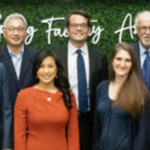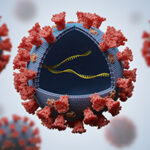Discoveries
Vanderbilt School of Medicine Basic Sciences names renowned scholar John Kuriyan as next dean
Jun. 21, 2022—Vanderbilt University has named John Kuriyan, one of the world’s leading structural biologists, as its next dean of the School of Medicine Basic Sciences, C. Cybele Raver, provost and vice chancellor for academic affairs, announced today. Kuriyan’s appointment, effective Jan. 1, 2023, will advance the university’s goal of expanding its global research impact by leveraging...
The academic startup guy: Larry Marnett, founding dean of Basic Sciences
Jun. 1, 2022—In the early 1960s, young Larry Marnett received his amateur radio license from the Federal Communications Commission. He put up an antenna outside his Kansas City, Kansas, home and began tapping away in Morse code. “It was just so cool to be ‘talking’ to someone in California or Canada,” Marnett recalled. After a conversation, radio...
Discovery of mosquito survival tactics leaves room for new disease vector control tactics
Jun. 1, 2022—The appendages that protrude from a mosquito’s head hold the sensory systems that account for nearly all of its ability to detect and respond to a wide range of chemical signals that are critical for its reproduction and its survival. At the molecular level, these systems rely on genes that make up three families of...
Study identifies first cellular “chaperone” for zinc, sheds light on worldwide public health problem of zinc deficiency
May. 19, 2022—We need zinc: one-tenth of the proteins in our cells require this metal for their normal functions in all aspects of cell metabolism. We acquire zinc by eating it — in foods or multivitamin supplements — but up to 30% of people in some parts of the world are at risk for zinc deficiency, which...
Coffey, Crowe, Denison honored with research excellence awards
May. 5, 2022—The 2022 Vanderbilt University School of Medicine Academic Enterprise Awards for Excellence in Teaching, Extraordinary Performance of Clinical Service, and Outstanding Contributions to Research were presented April 29 during the annual spring faculty meeting. The recipients include…
The Skaar lab discovers how bacterial pathogen survives without water
May. 5, 2022—The pathogen Acinetobacter baumannii can survive on hospital surfaces — without water — for months, an ability that has helped it become a leading cause of hospital-acquired infections. Now, a team of Vanderbilt researchers has discovered a mechanism this bug uses to live in a dried-out state: it produces “hydrophilin” proteins that protect against water...
Vanderbilt ranks 12th in annual survey of NIH funding; 2021 awards topped $445M
Apr. 1, 2022—Vanderbilt University again ranked among the nation’s top research institutions receiving funding from the National Institutes of Health, according to the latest data compiled by the Blue Ridge Institute for Medical Research. The total amount Vanderbilt scholars received across the School of Nursing, the School of Medicine Basic Sciences and 15 clinical sciences departments, which...
Crowe receives national award for COVID antibody research
Apr. 1, 2022—James Crowe Jr., MD, director of the Vanderbilt Vaccine Center, and Michel Nussenzweig, MD, PhD, of The Rockefeller University, have been jointly awarded the 2022 Harrington Prize for Innovation in Medicine for “groundbreaking work” that enabled the use of human antibodies to treat COVID-19. The announcement was made March 24 by Harrington Discovery Institute Institute...
Pietenpol named AACR Fellow
Mar. 24, 2022—The American Association for Cancer Research (AACR) has inducted Jennifer Pietenpol, PhD, and Yu Shyr, PhD, into the 2022 class of Fellows of the AACR Academy. The mission of the AACR Academy is to recognize and honor distinguished scientists whose scientific contributions have propelled significant innovation and progress against cancer. Fellows of the AACR Academy...
VIR-CLASP reveals new insights into cellular mechanisms of viral immune response
Sep. 10, 2020—By Brad Davidson RNA viruses invade cells and co-opt cellular machinery to replicate and translate their genomic material. To stave off infection until immune cells arrive, host cells rely on “intrinsic immunity factors” such as proteins already present within the cell. Through the rapid binding of intrinsic immunity factors, host cells might prevent a virus...







